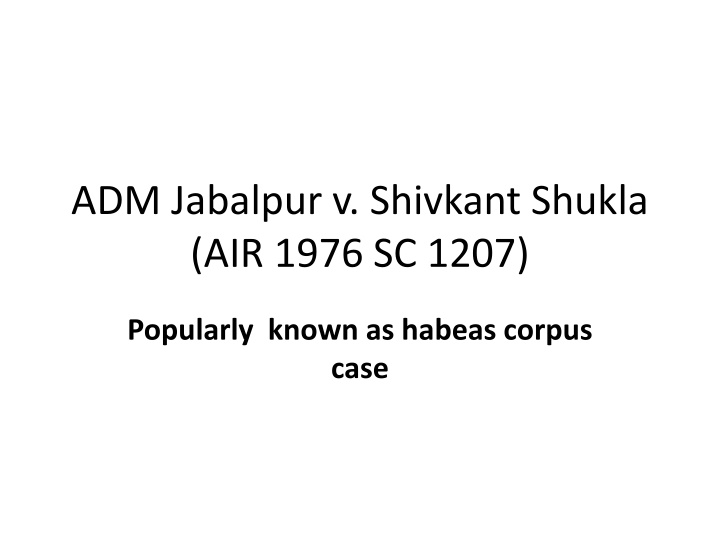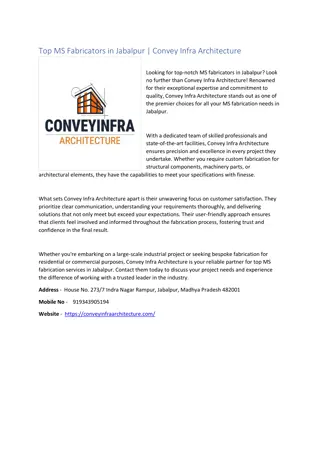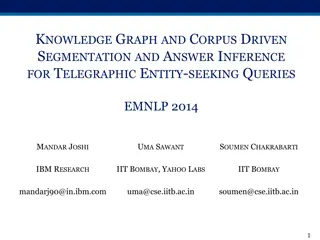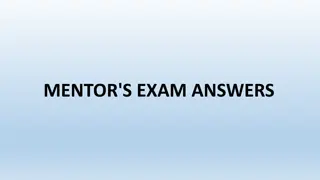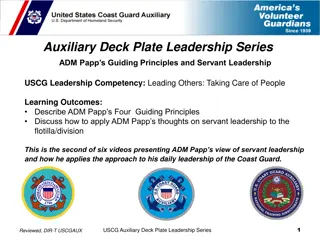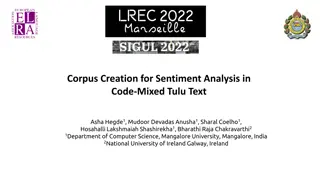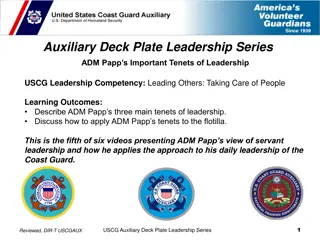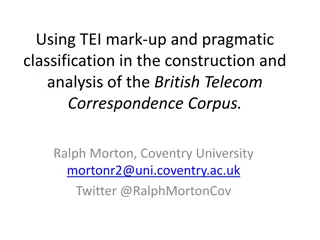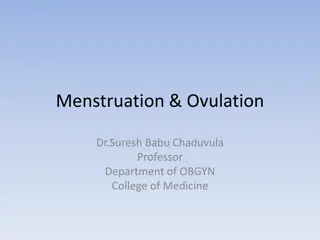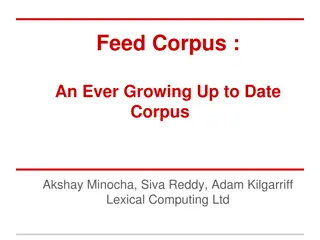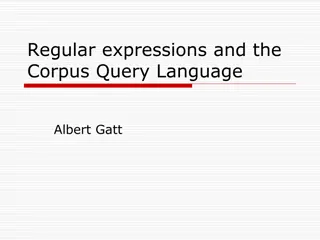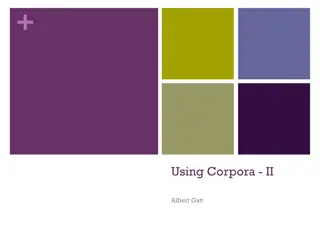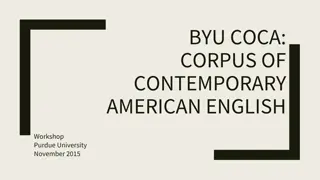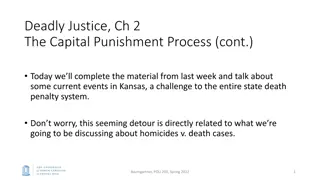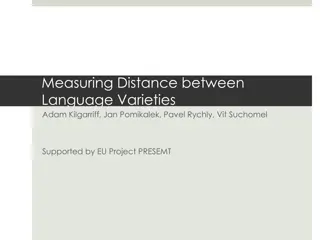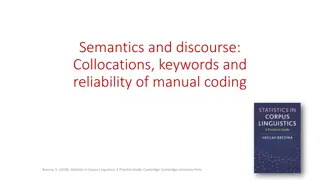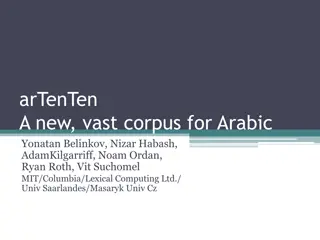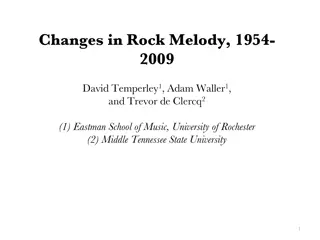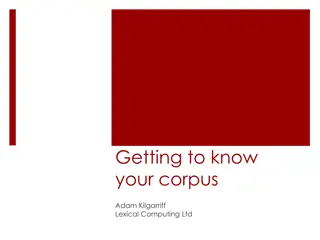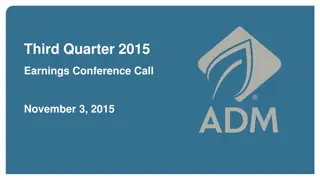ADM Jabalpur v. Shivkant Shukla: Habeas Corpus Case Analysis
During the Emergency in 1975, the ADM Jabalpur v. Shivkant Shukla case examined the suspension of certain fundamental rights by the Indian government. The issue revolved around the legality of detentions under preventive laws and the right to habeas corpus. The Supreme Court's decision in this case had significant implications for civil liberties and the balance of power during times of national emergency.
Download Presentation

Please find below an Image/Link to download the presentation.
The content on the website is provided AS IS for your information and personal use only. It may not be sold, licensed, or shared on other websites without obtaining consent from the author.If you encounter any issues during the download, it is possible that the publisher has removed the file from their server.
You are allowed to download the files provided on this website for personal or commercial use, subject to the condition that they are used lawfully. All files are the property of their respective owners.
The content on the website is provided AS IS for your information and personal use only. It may not be sold, licensed, or shared on other websites without obtaining consent from the author.
E N D
Presentation Transcript
ADM Jabalpur v. Shivkant Shukla (AIR 1976 SC 1207) Popularly known as habeas corpus case
Facts In 1971 war with Pakistan was just ended and the 1972 drought were the reasons given by the government for a declaration of emergency, as they were damaged the economic growth and blocked the growth of the nation. On June 27 1975, the exercise of power given by Clause (1) of Article 359 of the constitution were enforced on the people of India and the foreigners, within the right to approach the court to enforce Article 14 (right to equality), Article 21 and Article 22(prevention against detention in certain cases), Which are also available for foreigner and all the proceeding that was pending related to above- mentioned article will remain suspended for the period of Emergency.
Contd.. Anyone who was considered to be a political threat to the authorities or anyone who could raise his/her political opinion freely was taken into custody without trial under Prevention Detention Laws. This caused led to arrest of many leaders from opposition such as Atal Bihari Vajpayee, Morarji Desai, Jay Prakash Narayan, Lal Krishna Advani, under MISA (Maintenance of Internal Security Act) because all these leaders were proving to be a political threat to the Indira Gandhi. These people then filed petitions in various High Court in the country challenging the detainment. Most of the high court gave their judgement in favour of these petitions which compelled Indira Gandhi Government to approach Supreme Court for this issue and which became Additional District Magistrate Jabalpur V. Shivkant Shukla.It is also called the Habeas Corpus (To Produce the Body) Case because usually, this is a writ filed in a supreme court when someone is arrested. At the time when Emergency was proclaimed, this writ was not considered as a fundamental right under article 21 remained suspended
Issue The validity of the amendments to the laws of Articles 38 and 39. When these hearing requests were filed, the plaintiff raised the preliminary objection of maintainability for the fact that the request for release, a writ of Habeas corpus was issued. The accused alleged, in essence, to have been deprived of their personal liberty in violation of the procedure established by law, whose motive was at their disposal. Only Article 21 of the Constitution and taking into account the presidential order of June 27, 1975, which suspends the right to request the execution of the right conferred by this article, the petitions could be rejected at the threshold. While the superior courts of Andhra Pradesh, Kerala and Madras confirmed the preliminary objection, the present dispute has not been favourably received by the superior courts of Allahabad, Bombay (Nagpur Bench), Delhi, Madhya Pradesh, Punjab and Haryana. The state and the central government. Aggravated by the decision of several superior courts, he appealed the decision of the Supreme Court of the Kingdom.
Key Issue The main issue before their Lordship was whether, in execution of the Presidential Orders when a person was detained, if the High Court can entertain a writ of Habeas Corpus filed by a person challenging the ground for his detention?
Observation & Judgement In this case the four judges Chief Justice A.N. Ray, along with Justices M.H. Beg, Y.V. Chandrachud and P.N. Bhagwati has arrived at the same conclusion, which is that the writ of habeas corpus is not maintainable in case of proclamation of emergency under article 359(1) which states- Where a Proclamation of Emergency is in operation, the President may by order declare that the right to move any court for the enforcement of such of the fundamental rights conferred by Part III (except Article 20 and 21) as may be mentioned in the order and all proceedings pending in any court for the enforcement of the rights so mentioned shall remain suspended for the period during which the Proclamation is in force or for such shorter period as may be specified in the order.
Contd. The four judges said that the court has no authority or powers to challenge if the detention made under sec 16A(9)b (which states no person against whom an order of detention is made or purported to be made under Section 3 shall be entitled to the communication or disclosure of any such ground, information or material as is referred to in clause (a) or the production to him of any document containing such ground, information or material) as under the act it clearly states that the grounds of the detention need not be disclosed hence the court cannot question the state or the executive body to validate the detention. Hence the party does not have locus standi to movie to any court for maintain suit on fundamental rights. Justice Y. V. Chandrachud also said that the executive body must perform in accordance with the law passed by the parliament as it is the basic principle that all action of the executive must have law supporting its action. He further says that the precedential order issued under article 359(1)does not give clarity regarding disobeying the parliamentary law. Therefore, the state need not furnish the reason for dentation.
Contd. Justice Khanna had dissenting opinion on the point that during proclamation of emergency or presidential order under article 359(1) even if the person cannot go to the court of law for the enforcement of fundamental right under the constitutional remedy that does not restrain him from exercising his legal remedy through statute. Also, he denied that article 21 is not the sole repository of right to life and personal liberty even in absence of article 21 in the constitution the state cannot deprive a person from his right to life and personal liberty as this formulates the basic postulate of a civilized society. During the proclamation of emergency article 21 only loses the procedural power but the substantive power of this article is very fundamental and the State does not have the power to deprive any person life and liberty without the authority of law. The Majority judgment held that a person cannot approach the court with the writ of habeas corpus or of any other writ remedy. Also, the court of law does not have the power to look into the validity of detention under Maintenance of Internal Security Act, 1971 as the statue does not give powers to the court the review the validity of the detention
Contd. The Hon ble Supreme Court for this situation watched that Article 21 covers Right to Life and personal liberty against its unlawful dispossession by the State and if there should arise an occurrence of suspension of Article 21 by Emergency under Article 359, the Court can t scrutinize the expert or lawfulness of such State s choice. Article 358 is significantly more extensive than the Article 359 because on one hand all the fundamental rights are suspended as entire according to Article 358, but on the other hand Article 359 does not suspend any rights. Notwithstanding being Emergency arrangements under Article 359 (1) endow unique power and status on the Executive, it doesn t undermine the indispensable elements of the sovereignty of division of powers, prompting to an arrangement of what is known to be a system of checks and balances and constrained authority of the Executive.
Contd.. The nexus amongst State and Executive is flawed and the impact of suspension of such rights will emerge in the form of additional energy in the hands of the legislature which may formulate laws against the fundamental rights. This act ought not be considered as a power of the Executive or right of it. There is a legal and reasonable degree to which a State can act in or against the people and for this situation, it was high abuse of powers of individual political profit of a particular individual. Amid Emergency, it is nowhere talked about that the authority of State increases from its original control under Article 162.
Contd. Additionally, the State just holds the privilege to arrest if the supposed act falls under Section 3 of MISA and its each condition is satisfied. In the event that any condition is unfulfilled then detention is past the powers of State. The verdict by the Supreme Court is said to be the greatest incorrect judgment till date. contradicting opinion of Justice Khanna still holds more substance than the majority judgment including the then Chief Justice. The unjust objective of Indira Gandhi s government came to the surface when Justice Khanna asked the first troubling yet valid question. Life is also mentioned in Article 21 and would Government argument extend to it also? There was no way out. Without even a tinge of hesitation, the counsel for the government replied, Even if life was taken away illegally, courts are helpless . Before Proclamation of Emergency there was rampant political instability in the Country after the election of Indira Gandhi was termed to be as unlawful.
Contd.. This entire scenario was brought about in order to put resistance on the opposition and amidst the procedure, even the Hon'ble Supreme Court made significant mistakes in the judgment and it can be said to be absolutely unlawful. Just the boldness of single judge is said to be worth perusing and it was in consonance with humanity, freedom and liberty.
